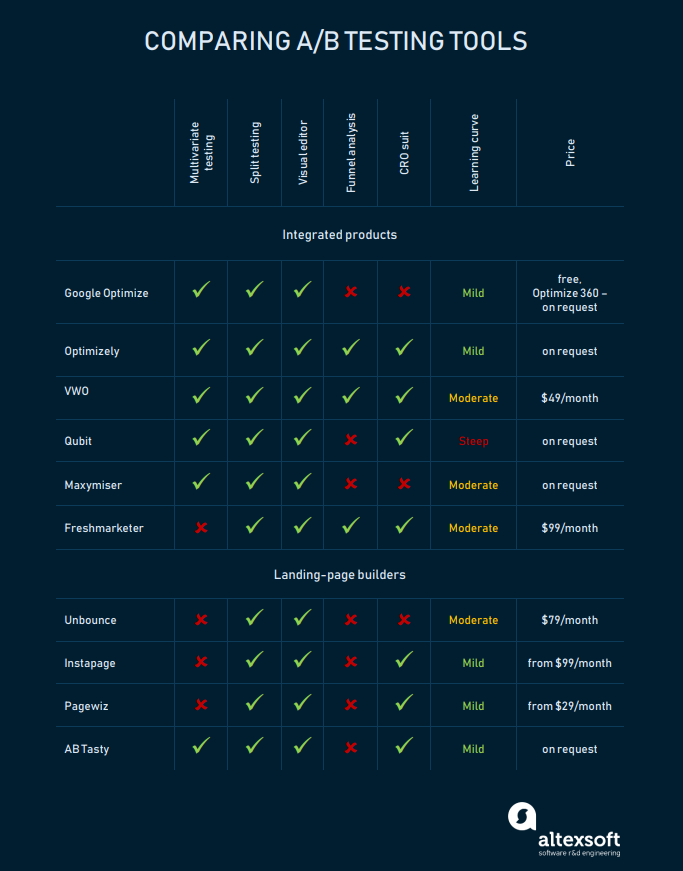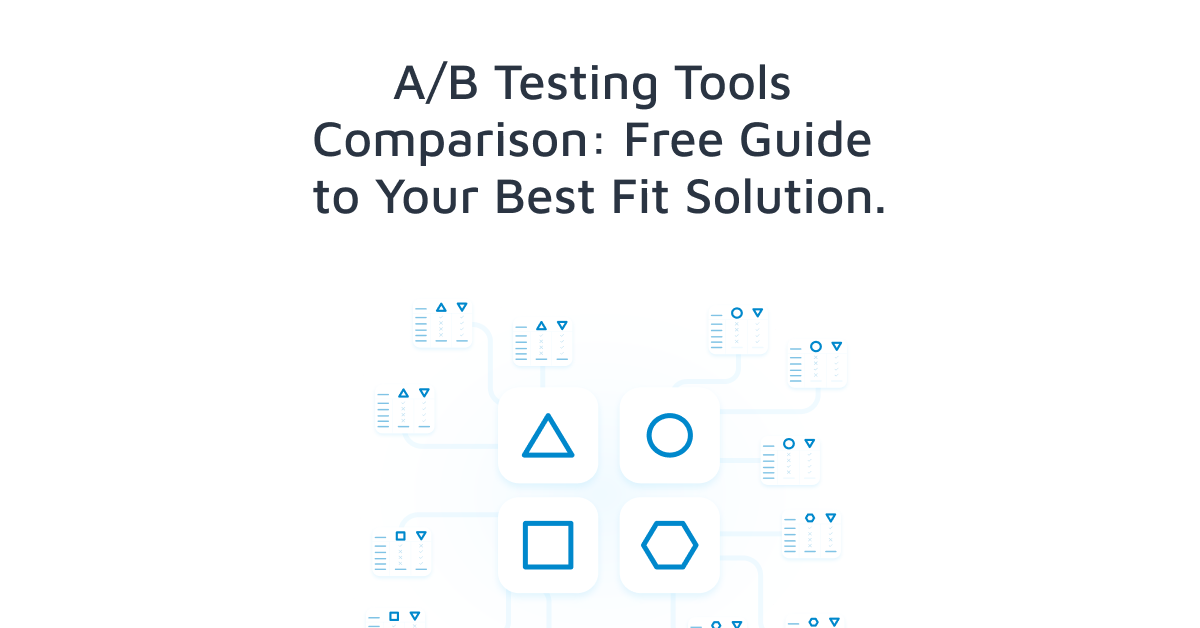Cro tools vary widely in features and usability. Comparing them helps find the best fit.
Choosing the right CRO (Conversion Rate Optimization) tool can transform your business. With many options available, understanding their strengths and weaknesses is key. This comparison will break down popular CRO tools, helping you make an informed choice. Whether you are a small business or a large corporation, knowing which tool suits your needs can save time and boost performance.
Let’s dive into the details and explore what each tool offers. This guide aims to simplify your decision-making process, ensuring you pick the tool that aligns perfectly with your goals.
Introduction To Cro Tools
Conversion Rate Optimization (CRO) tools help improve website performance. They focus on turning visitors into customers. These tools analyze user behavior, test changes, and measure results. The right CRO tools can boost your business growth.
Importance Of Cro
CRO is crucial for businesses. It enhances the user experience. Better user experience means more conversions. Higher conversions lead to increased revenue. CRO also helps identify and fix website issues. This improves overall site performance.
Role Of Cro Tools
CRO tools play a significant role. They provide valuable insights. These insights help understand user behavior. With CRO tools, you can test different elements. This includes headlines, images, and call-to-action buttons.
Here are some key roles of CRO tools:
- Heatmaps: Show where users click and scroll.
- A/B Testing: Compare different versions of a webpage.
- Analytics: Track user behavior and conversion rates.
Using CRO tools can lead to better decision-making. They help in creating more effective marketing strategies. This results in higher engagement and better conversion rates.
Comparison Of Popular Cro Tools
Here is a comparison of some popular CRO tools:
| Tool | Key Features | Pricing |
|---|---|---|
| Optimizely |
|
Starts at $50/month |
| Hotjar |
|
Free plan available |
| VWO |
|
Starts at $99/month |
Choosing the right CRO tool depends on your needs. Consider features, budget, and user-friendliness. Proper use of CRO tools can significantly impact your business growth.

Credit: www.altexsoft.com
Top Cro Tools
Choosing the right Conversion Rate Optimization (CRO) tool can be challenging. There are many options, and each offers unique features. Let’s explore the top CRO tools available today.
Tool 1: Features
Tool 1 offers a range of features to enhance your website’s performance.
- A/B Testing: Test different versions of your web pages.
- Heatmaps: Visualize where users click and scroll.
- Visitor Recordings: Watch real-time user interactions on your site.
- Form Analytics: Analyze form performance to reduce drop-offs.
Tool 2: Features
Tool 2 focuses on providing detailed insights and user feedback.
- Surveys: Collect user feedback directly from your site.
- Polls: Engage visitors with quick questions.
- Funnel Analysis: Identify where users drop off in the conversion process.
- Session Replays: Replay user sessions to understand behavior.
Tool 3: Features
Tool 3 combines advanced analytics with easy-to-use interfaces.
- Split Testing: Run multiple tests simultaneously.
- Personalization: Deliver customized content to different user segments.
- Page Speed Insights: Monitor and improve page load times.
- Customer Journey Mapping: Visualize entire user journeys.
Each tool offers unique benefits. By understanding these features, you can choose the best tool for your needs.
Pricing And Plans
Choosing the right CRO tool involves comparing their pricing and plans. This ensures you get the best features at the best price. Let’s look at the options available for free plans, paid plans, and enterprise solutions.
Free Plans
Many CRO tools offer free plans to attract new users. These plans often come with limited features but are great for small businesses or those just starting out.
- Tool A: Includes basic A/B testing and up to 10,000 monthly visitors.
- Tool B: Offers heatmaps and session recordings for up to 5,000 monthly visitors.
- Tool C: Provides form analytics and basic reporting tools.
Paid Plans
Paid plans unlock more features and higher usage limits. They are suitable for growing businesses and established companies.
| Tool | Price | Features |
|---|---|---|
| Tool A | $49/month | Advanced A/B testing, up to 100,000 monthly visitors, priority support. |
| Tool B | $79/month | All free features plus funnels, user segmentation, and up to 50,000 monthly visitors. |
| Tool C | $99/month | Advanced reporting, multivariate testing, and up to 150,000 monthly visitors. |
Enterprise Solutions
Enterprise solutions cater to large companies with specific needs. These plans offer custom pricing and tailored features.
- Tool A: Custom pricing, dedicated account manager, unlimited visitors.
- Tool B: Advanced integrations, personalized onboarding, 24/7 support.
- Tool C: White-glove service, custom dashboards, and team training sessions.
Choosing the right plan depends on your business size and goals. Evaluate the features and costs to make an informed decision.
Ease Of Use
Ease of use is a critical factor when selecting CRO tools. A user-friendly tool can save time and reduce frustration. Let’s explore how different tools compare in terms of user interface and learning curve.
User Interface
A clean and intuitive user interface (UI) is essential for any CRO tool. An ideal UI should have:
- Clear navigation
- Easy access to features
- Minimal clutter
Here is a comparison of the UI of popular CRO tools:
| Tool | UI Rating | Comments |
|---|---|---|
| Tool A | ⭐⭐⭐⭐⭐ | Sleek design, very intuitive |
| Tool B | ⭐⭐⭐⭐ | User-friendly but a bit cluttered |
| Tool C | ⭐⭐⭐ | Functional but not visually appealing |
Learning Curve
The learning curve is another important aspect. A steep learning curve can be a barrier to effective use. Here’s a look at the learning curve for various tools:
- Tool A: Easy to learn, offers tutorials and support.
- Tool B: Moderate difficulty, requires some prior knowledge.
- Tool C: Difficult to master, lacks comprehensive guides.
For beginners, Tool A is the best choice due to its simplicity. Tool B suits those with some experience. Tool C is for advanced users who don’t mind a challenge.
Integration Capabilities
Integration capabilities are crucial for CRO tools. These tools should easily connect with other software. This helps you streamline processes and improve efficiency.
Third-party Integrations
Many CRO tools offer third-party integrations. This feature lets you connect your CRO tool with other platforms. For instance, you can integrate with:
- Email marketing software
- CRM systems
- Analytics tools
- Content management systems (CMS)
Such integrations allow seamless data flow. This means you get more accurate insights and can take data-driven actions faster. Most CRO tools support popular platforms like:
- Google Analytics
- Salesforce
- Mailchimp
- WordPress
Api Access
Some CRO tools offer API access. This feature is essential for custom integrations. With an API, you can create custom workflows and automate tasks. This adds flexibility to your CRO efforts.
An API (Application Programming Interface) allows your CRO tool to communicate with other software. You can pull data from one system and push it to another. Here are some common uses:
- Automating data collection
- Syncing user data across platforms
- Generating custom reports
Most CRO tools provide detailed documentation for their APIs. This helps developers create robust integrations. Here are some popular CRO tools with API access:
| Tool | API Documentation |
|---|---|
| Optimizely | Optimizely API Docs |
| VWO | VWO API Docs |
| Google Optimize | Google Optimize API Docs |
Using APIs, you can enhance the functionality of your CRO tools. This leads to better user experiences and higher conversion rates.
Customer Support
Customer support is crucial for any CRO tool. Users need quick help when things go wrong. Good support can make a big difference. Let’s compare the customer support of some popular CRO tools.
Support Channels
Different tools offer various support channels. These channels help users solve their issues.
| Tool | Email Support | Live Chat | Phone Support | Help Center |
|---|---|---|---|---|
| Tool A | Yes | Yes | No | Yes |
| Tool B | Yes | No | Yes | Yes |
| Tool C | No | Yes | Yes | Yes |
Response Time
Response time is the period it takes to get a reply. Quick responses are important for users.
| Tool | Email Response Time | Live Chat Response Time | Phone Response Time |
|---|---|---|---|
| Tool A | 24 hours | Instant | N/A |
| Tool B | 48 hours | N/A | 2 hours |
| Tool C | N/A | Instant | 1 hour |
Tool C shines with its fast phone support. Tool A and Tool B offer reliable email support. Tool A also provides instant live chat responses. Users should choose based on their preferred support channel and response time needs.
Case Studies
Case studies provide a real-world view of how CRO tools work. They highlight the success and practical applications across different industries. Let’s explore these through success stories and industry applications.
Success Stories
Many companies have seen significant growth using CRO tools. Here are some notable examples:
| Company | Tool Used | Result |
|---|---|---|
| Company A | Tool X | Increased conversions by 35% |
| Company B | Tool Y | Boosted sales by 25% |
| Company C | Tool Z | Reduced bounce rate by 40% |
Company A used Tool X to improve their landing pages. This led to a 35% increase in conversions. Company B implemented Tool Y to optimize their checkout process. Their sales went up by 25%. Company C used Tool Z to enhance their website’s user experience. Their bounce rate dropped by 40%.
Industry Applications
CRO tools are versatile and can be used in various industries. Here are some examples:
- E-commerce: Tools help optimize product pages and checkout processes. This boosts sales and reduces cart abandonment.
- Healthcare: Tools improve patient engagement and streamline appointment bookings.
- Education: Tools enhance online course sign-ups and student retention.
In e-commerce, CRO tools focus on product pages and checkout processes. This results in higher sales and fewer abandoned carts. In the healthcare sector, these tools help improve patient engagement. They also make appointment booking easier. For the education industry, tools boost online course sign-ups. They also help in retaining students.
These case studies demonstrate the power of CRO tools. They show how businesses from various sectors benefit. The results speak for themselves.

Credit: insightwhale.com

Credit: www.convert.com
Frequently Asked Questions
What Are Cro Tools?
Cro Tools are software tools designed for Conversion Rate Optimization (CRO). They help improve website performance by increasing the percentage of visitors who take desired actions.
How Do Cro Tools Work?
Cro Tools analyze user behavior and website data. They identify areas for improvement and test different strategies to enhance user experience and increase conversions.
Why Use Cro Tools?
Using Cro Tools helps optimize website performance. They improve user experience, increase conversion rates, and ultimately boost revenue by turning more visitors into customers.
What Features Do Cro Tools Offer?
Cro Tools offer features like A/B testing, heatmaps, user session recording, and analytics. These features help in understanding user behavior and improving website design.
Conclusion
Choosing the right CRO tool can boost your website’s performance. Compare features, pricing, and ease of use. Consider your specific needs and goals. Test different tools to find the best fit. Remember, the right tool can make your job easier.
Stay updated with new features and trends. Happy optimizing!
